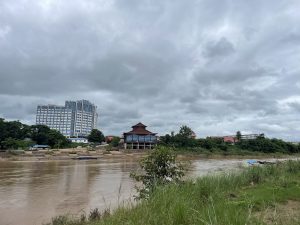Thailand’s National Broadcasting and Telecommunications Commission (NBTC) says that it has cut off internet and phone connections to an area of southeastern Myanmar that is home to large-scale online scam operations, local media reported last week.
According to a report from Voice of America’s Burmese service, an NBTC official told a press conference on May 9 that it had disconnected the internet cables and mobile phone signals between Thailand and the town Shwe Kokko in Myanmar’s Kayin (Karen) State. It said that the connections that had been supplied to online scammers in Shwe Kokko were illegal.
In recent years, Shwe Kokko, a town in Myawaddy Township just over the border from the Thai town of Mae Sot, expanded into a neon-soaked settlement of casinos, online scam operations, and other sordid and criminal activity. Most of the scam operators in Shwe Kokko started out with casino developments in the late 2010s and then later diversified into telecom fraud schemes that have lured hundreds of workers, many of them from China, with promises of high-paying jobs, only to effectively enslave them upon arrival.
This week, The Irrawaddy published an interview with one young worker from Myanmar who was duped into working at Shwe Kokko, who estimated that there were about 30 scam companies operating in the town, each employing “at least 100 people,” many of which took place in compounds that also included prostitution, narcotics trafficking, and gambling. The operations, conducted via fraudulent emails and text messages, “mainly targeted European and U.S. citizens, particularly elderly persons who are easy to swindle.”
The framework for Shwe Kokko’s development is a joint venture arrangement between the Myanmar unit of the Hong Kong-registered Yatai International Holding Group and a firm controlled by the Karen Border Guard Force (BGF), which controls a swath of territory in eastern Kayin State.
The reports of the NBTC official’s comments did not make clear whether the commission itself has cut off the connections, or whether this was the responsibility of Thai internet service providers and/or local officials. It also did not make clear whether the action or order applied also to KK Park, another center of online scam operations in Myawaddy Township.
It is unclear whether the belated Thai move to restrict internet connections to Shwe Kokko will have an effect on the town’s scamlords. Last June, Thailand’s Provincial Electricity Authority (PEA) claimed to have cut off power to Shwe Kokko. While the move prompted many to cross the border into Thailand to purchase generators, it evidently failed to stymie the online fraud operations, which are merely used some of their gargantuan profits to invest in alternative sources of power. Indeed, the number of scam operations in Shwe Kokko may have actually increased since, as China has cracked down on similar operations based along its own border with Myanmar.
Interestingly, the Thai order was preceded by a BGF directive, issued on May 3, mandating the evacuation of foreign individuals engaged in online businesses by the end of October. “Foreigners who illegally cross the border must leave the country by the way they came. If found after October 31, effective action will be taken,” reads the English version of the directive, which was also written in Burmese and Chinese.
The Irrawaddy quoted a BGF spokesperson as saying that the group was unhappy with the online scammers who were operating from its territories. “We have repeatedly told them to leave,” the outlet quoted the spokesperson as saying. But as with its decision earlier this year to sever its ties with the military, the BGF’s true motivations are obscure. The group has reportedly earned $192 million annually from scammers and other businesses operating in Shwe Kokko, according to a recent report by the United States Institute of Peace, of which it has paid half to the Myanmar military. (It is uncertain whether this agreement still holds following the BGF’s break with the military.)
Given how much it would stand to lose from a genuine crackdown, the BGF directive must therefore be seen in the context of recent developments, particularly the struggle between the Myanmar military and Karen National Union (KNU) for control over Myawaddy town on the Thai border. The BGF and its leader, Col. Saw Chit Thu, successfully supported both sides during the fight over the town including taking steps to help the military take back the town after it was briefly captured by the KNU. Its policy was seemingly geared at preserving its autonomy amid the shifting conflict dynamics in Kayin State.
This suggests that any attempt to crack down on scam operators in its border area comes wrapped in a hidden agenda – one aimed at the perpetuation of the Saw Chit Thu’s autonomy and the business activities, some of them criminal, that underpin it.

































